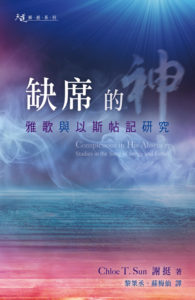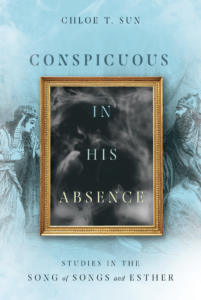About Conspicuous in His Absence
A Conversation with Chloe Sun
Every Voice: What led you to write this book? What problem or issue(s) are you seeking to address?
Chloe Sun: I am always interested in the study of the Megilloth (the five scrolls), the female characters in the Old Testament, and the theology of these books. So one of my students suggested to me: “Why not write about the Song of Songs and Esther?” That was the inception of the book. Then I asked myself: What binds these two books together? Then it occurred to me—the lack of explicit mention of God’s name!
The five questions I attempted to address in the book include:
- Why would these two books conceal the name of God when the references are
found throughout the rest of Scripture? - Why would the Jewish people recite these two books at two of their festivals
associated with the rescue of God’s people when these two books forgo any
direct mention of God? - What does the literary absence of God’s name say about the nature of God and
his activities in the world? - How do we think of God when he is absent?
- What do we do when God is silent or hidden?
The first three questions are concerned with theology, about knowing God and his revelation in the Scripture, while the last two questions pertain to the contemporary relevance of the study.
EV: What is the thesis of your book?
CS: God’s presence and absence are not mutually exclusive. Placing the Song of Songs and Esther front and center in Old Testament theology yields a portrait of a God who neither works according to human beings’ expectations nor conforms to his own pattern of presence in the past. By including these two books, Scripture bears witness to the multifaceted nature of God. The reality of the absence of God then opens up opportunities for honest dialogue with God and with oneself.
EV: Who’s your target audience, and what are you most hoping they hear from it?
CS: My target audience includes everyone who is interested in knowing God, who is wrestling with the experience of the absence of God and tries to make sense of it, and who likes to think and study theology in general and Old Testament theology in particular. And of course, those who like the Song of Song, Esther, and Megilloth are my target audiences.
I hope my audience would appreciate the theological, spiritual, and practical insights offered by the book and draw themselves a step closer to contemplating the implications of the absence of God in one’s life and in the world.
EV: Did you have any “aha” moments while writing the book?
CS: Definitely. When I learned that Jesus experienced divine absence on the cross when he uttered Psalm 22:1, it was also at that very moment, God’s plan of salvation through Jesus was accomplished. Therefore, I am convinced that divine presence and absence can be integrated into one single reality.
EV: What was the most challenging part of the book to write?
CS: For the most part, writing this book has been an enjoyable journey. The most challenging part I would say is the chapter on “Temple: Garden and Palace.” The descriptions of the Persian palace bear striking resemblance to the descriptions of the Jewish temple in Jerusalem. I had a hard time grappling with the meaning behind this resemblance and didn’t find other studies that address this issue satisfactorily.
EV: If your book was made into a movie, what actor/actress would play the lead role?
CS: This is a fun question.
For the Song of Songs, Katy Perry would make a female character come alive since Katy is beautiful and she acts and sings. For the actor, maybe Orlando Bloom to play the male character in the Song?
For Esther, Audrey Hepburn would make a great Esther. I can’t think of a contemporary actress to play Esther. For Mordecai, how about Anson Mount? For Haman and the Persian king, how about Danny DeVito and Steve Martin, respectively?
EV: What kind of seminary/church classes should assign your book?
CS: The book can serve as a “minority voice” or “female voice” in the Old Testament Theology course. It can be assigned as a reference book in the Megilloth, Song of Songs, and Esther. It can also be used as a book in Hermeneutics or Biblical Interpretation courses or in courses addressing methods of studying the Old Testament. If there is a course on Knowing God in the Old Testament, this book can be on the reading list.
EV: Is your book available in any other languages?
CS: The book has been translated into Chinese and will be out in mid-July, 2023 in Hong Kong.

About the Author

Chloe Sun (PhD, Fuller Theological Seminary) is Professor of Old Testament and Program Director of the Chinese Studies Center at Fuller Theological Seminary.

